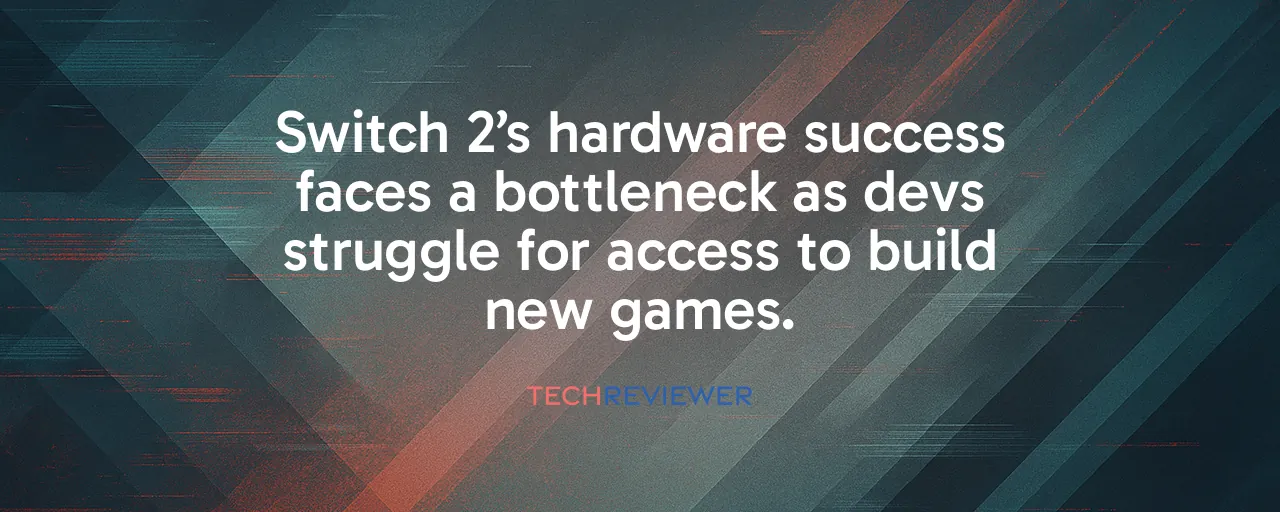A Hot Console, A Cold Dev Scene
Three months after its June 2025 launch, the Nintendo Switch 2 has sold a staggering 8 million units, making it the fastest-selling console in the company's history. With a custom Nvidia chip pumping out crisp 4K visuals in docked mode and smooth 1080p on the go, it's no wonder fans are snapping it up. Games like Metroid Prime 4 and a polished Cyberpunk 2077 2.0 show what the hardware can do, hitting stable 60 frames per second with ray-traced lighting that the original Switch could only dream of. But there's a catch. A surprising number of developers, from big names like Ubisoft to scrappy indie teams, can't get their hands on the dev kits needed to build native Switch 2 games. This bottleneck is slowing the console's game library to a crawl, leaving players with a solid but slim lineup.
At Gamescom 2025 in Cologne, developers spilled their frustrations. Many studios, including some heavy-hitting AAA publishers, were told to stick with the original Switch and rely on backward compatibility instead of building for the new hardware. This is a significant roadblock that could negatively shape the Switch 2's early years. With 71% of sold games being either first-party titles or re-released older ones, the lack of fresh third-party content is starting to show.
Why Devs Are Locked Out
Nintendo's approach to dev kits feels like a velvet-rope nightclub. Some get in, others are left outside, and the guest list is a mystery. Reports from Gamescom revealed that even major studios, like those behind blockbuster franchises, are struggling to secure Switch 2 dev kits. Meanwhile, a few smaller indie teams, such as the creators of a quirky campfire simulator, have somehow made the cut. This uneven access has sparked plenty of grumbling in developer circles. Nintendo's strict NDA process and a rumored three-phase kit rollout, starting with internal teams, then select partners, and eventually wider access, are to blame.
Why the tight grip? Nintendo has a long history of prioritizing secrecy to prevent leaks, a strategy that worked wonders for the original Switch's surprise-filled launch. But this time, the approach seems to be backfiring. Developers want to tap into the Switch 2's beefy 16 GB of LPDDR6 memory and SSD-grade asset streaming, which make tools like Unreal Engine 5's Lumen a breeze to implement. Without kits, they're stuck tweaking old Switch games for backward compatibility, which often means clunky performance compared to native titles. The result? A thinner game pipeline than fans expected.
Real-World Fallout: Warframe and Beyond
Take Digital Extremes, the studio behind Warframe. They've been itching to update their free-to-play juggernaut for the Switch 2's enhanced hardware, which could deliver sharper visuals and faster load times. But without a dev kit, they've had to delay their plans, leaving fans waiting. This isn't an isolated case. Several Kickstarter campaigns for promising indie games now carry vague "Switch 2 version TBA" disclaimers, as smaller studios face the same kit scarcity. These delays hit smaller teams hardest, as they miss out on the console's early sales surge, which has already seen 3.1 games sold per unit.
On the flip side, some developers have found ways to shine. An indie studio behind a niche title, a cozy, camera-based campfire game, secured a kit and is now prepping a Switch 2 exclusive that takes full advantage of the console's pointer-mode Joy-Con sensors. Their success shows what's possible when Nintendo opens the door, even just a crack. The contrast between these cases highlights a broader issue: Nintendo's selective strategy risks alienating the diverse developer ecosystem that made the original Switch a hit.
Echoes of the Wii U's Stumble
Nintendo's not new to this game. Back in the Wii U days, similar dev-kit shortages led to a third-party drought that the console never recovered from. Historically, smaller studios waited six months for kits during the Wii U era, and by then, major publishers like EA had already shifted focus to Sony and Microsoft's platforms. The Switch 2's current 29% third-party release ratio, well below the 35% needed for strong platform momentum, according to a University of Kyoto study, rings alarm bells. If Nintendo doesn't loosen its grip soon, it could repeat the Wii U's mistakes, even with the Switch 2's stronger hardware and early sales lead.
Sony's PS5 launch offers a counterpoint. In 2020, Sony flooded developers with kits, ensuring a robust launch lineup despite supply chain hiccups. Titles like Demon's Souls showcased the PS5's power right out of the gate, keeping players hooked. Nintendo's more cautious approach, while understandable for leak control, risks leaving the Switch 2's potential untapped. Players are already noticing the gap, with some native titles shining while backward-compatible games feel like stopgaps.
What's Next for Switch 2's Library
Nintendo's not oblivious to the problem. Whispers from the industry suggest a wider dev-kit wave could hit in late 2025, possibly alongside cloud-based virtual kits that let studios compile remotely. Partnerships with engine vendors like Unreal or Unity could also speed things up by offering pre-certified templates. These steps would help, but they're not a quick fix. Developers need time to optimize for the Switch 2's new API extensions, like NVN 3, which demand hands-on testing to unlock the console's full potential.
For players, the stakes are clear. A richer game library means more reasons to keep the Switch 2 plugged in, whether it's for AAA epics or quirky indies. For developers, broader kit access could unlock the console's sales surge, especially for smaller studios banking on early buzz. And for Nintendo, balancing secrecy with openness will decide whether the Switch 2 can sustain its scorching start. The console's got the hardware to impress. Now it needs the games to match.
